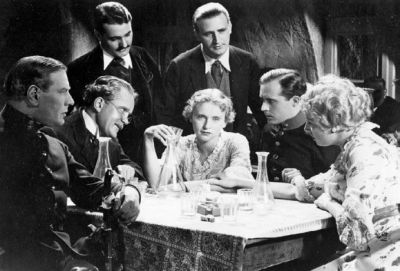
VORSTADTVARIETÉ
(Suburban Cabaret, Austria/1933) R.: Werner Hochbaum. D.: 96'. V. tedesca
[Varietà di provincia] T. alt.: Die amsel von lichtental. T. int.: Suburban Cabaret. Sogg.: dalla pièce Der Gemeine di Felix Salten. Scen.: Werner Hochbaum, Ernst Neubach. F.: Eduard Hoesch. M.: Ludolf Grisebach. Scgf.: Alfred Kunz. Mus.: Anton Profes. Int.: Mathias Wieman (Josef Kernthaler, Bauzeichner), Frida Richard (madre di Josef), Hans Moser (padre di Josef), Luise Ullrich (Mizzi), Oskar Sima (Franz), Olly Gebauer (Sophie), Anton Pointner (tenente Höfelmeyer), Otto Hartmann (luogotenente von Daffinger). Prod.: Styria-Film, GmbH Wien. 35mm. L.: 2616 m. D.: 96'. versione tedesca / German version. Da: Deutsche Kinemathek
Il primo dei quattro film girati da Hochbaum in Austria è tratto da un soggetto inconfondibilmente viennese, l'opera teatrale di Felix Salten Der Gemeine, ritratto di un'epoca di transizione e insieme feroce critica del militarismo. Hochbaum conserva il tema e l'atmosfera dell'originale ma li sposta in avanti nel tempo, scelta che può essere anche letta come un commento al regime autoritario austriaco: il film è ambientato nel 1913, all'approssimarsi della Prima guerra mondiale.
Vienna, che nel cinema degli anni Trenta ama apparire incantevole, cosmopolita e leggermente frivola, in Vorstadtvarieté si presenta come un luogo di (auto)inganni, di sfacciato opportunismo e di sogni spezzati. La storia ha inizio nell'atmosfera gaudente e gioiosa del parco dei divertimenti del Prater. Mizzi Ebeseder, figlia di celebri cantanti di cabaret, sogna di fare l'artista nel teatro di varietà di famiglia. Adora cantare. Il suo fidanzato, il disegnatore tecnico Josef Kernthaler, le dà però un ultimatum: se sceglierà il palcoscenico sarà la fine del loro amore. Il conflitto si acuisce quando Josef viene arruolato nell'esercito. Il lassismo morale dei camerati, l'economia dei desideri e l'ambiente frivolo e vistoso del teatro lo paralizzano. Il suo mondo privo di sfumature inizia a incrinarsi e la resa dei conti si avvicina. Con le sue richieste, Josef mette Mizzi con le spalle al muro. Lei si sente mancare la terra sotto i piedi, vacilla, esita tra il varietà e la promessa di matrimonio, tra la città e la campagna, tra il costume di scena e l'uniforme militare. Il suo spazio vitale si restringe, e non solo il suo.
A tutto ciò Hochbaum risponde con lo sguardo attento di una macchina da presa mobilissima che crea i propri spazi lirici, si fissa sui volti, insegue i dettagli visivi "perché è più facile fotografare le cose che le emozioni": è questa la lezione che il regista ha appreso dal teorico del cinema che più stima, Béla Balázs.
La censura non permise a Hochbaum di esprimere liberamente la propria visione cinematografica di Vienna. L'epilogo tragico dovette essere reinterpretato in chiave lieta, e il sottotitolo del film fu eliminato. Avrebbe dovuto essere Un canto dell'umanità austriaca.
Elisabeth Büttner
The first of four films which Hochbaum made in Austria: the subject matter is genuinely Viennese, Felix Salten's stage play Der Gemeine, a scenario about the transition to the 20th century and, at the same time, a scathing critique of the militarism of the epoch. Hochbaum takes up the atmospheric and thematic grounding, but with a leap in time, which can also be read as a comment on the then-contemporary authoritaria regime in Austria. He transfers the plot to the year 1913, the lead-in to the First World War.
Vienna, which likes to appear charming, slightly frivolous, and cosmopolitan in the cinema of the early 1930s, presents itself in Vorstadtvarieté as a place of self-delusion, of brazenly taking advantage, and of broken dreams. The story begins in the pleasure-seeking environment of the Prater amusement district. Mizzi Ebeseder, the daughter of popular cabaret singers, toys with the idea of a stage career at the family-owned variety theater. Singing is bliss for her. Her fiancé, though, architectural draftsman Josef Kernthaler, sets a clear ultimatum: for her to go to the stage would mean their immediate breakup. The conflict sharpens when Josef is drafted into the army. His comrades' moral laxness, the economies of desires, the buzz and tinsel of the theater make him freeze completely. His world, which knows no nuances, is cracking at the seams. The phantasm of purging is on the rise. Josef 's demands pull the rug out under Mizzi: she staggers, wavering between singing her number and the promise of marriage, between city and country, between a stage costume and a soldier's uniform. Her space in life is caving in, and not only hers.
To this, Hochbaum responds with a highly mobile and subtle camera. It creates its own spaces, sometimes lyrical, holding on faces, oriented toward the play of visual details, "because things are easier to photograph than emotions". This was a credo that he had learned from the cinematic polymath he appreciated most, Béla Balázs.
The censors did not let Hochbaum get away lightly with his filmic statement about Vienna. The tragic ending had to be reinterpreted into a happy one, and the movie was stripped of its subtitle. It had been A song of Austrian humanity.
Elisabeth Büttner
Tariffe:

Numero posti: 144
Aria condizionata
Accesso e servizi per disabili
Il nostro cinema aderisce al circuito CinemAmico: è possibile utilizzare l’applicazione MovieReading® per i film di cui è prevista audiodescrizione e/o sottotitolazione sull'applicazione.
Tel. 0512195311











